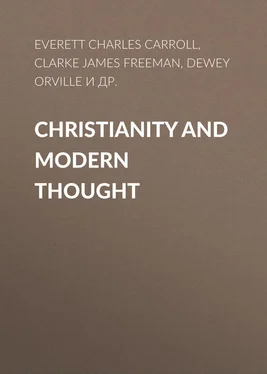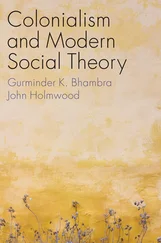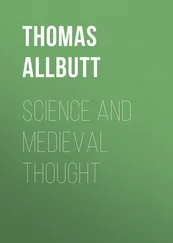Andrew Peabody - Christianity and Modern Thought
Здесь есть возможность читать онлайн «Andrew Peabody - Christianity and Modern Thought» — ознакомительный отрывок электронной книги совершенно бесплатно, а после прочтения отрывка купить полную версию. В некоторых случаях можно слушать аудио, скачать через торрент в формате fb2 и присутствует краткое содержание. Жанр: foreign_antique, foreign_prose, на английском языке. Описание произведения, (предисловие) а так же отзывы посетителей доступны на портале библиотеки ЛибКат.
- Название:Christianity and Modern Thought
- Автор:
- Жанр:
- Год:неизвестен
- ISBN:нет данных
- Рейтинг книги:5 / 5. Голосов: 1
-
Избранное:Добавить в избранное
- Отзывы:
-
Ваша оценка:
- 100
- 1
- 2
- 3
- 4
- 5
Christianity and Modern Thought: краткое содержание, описание и аннотация
Предлагаем к чтению аннотацию, описание, краткое содержание или предисловие (зависит от того, что написал сам автор книги «Christianity and Modern Thought»). Если вы не нашли необходимую информацию о книге — напишите в комментариях, мы постараемся отыскать её.
Christianity and Modern Thought — читать онлайн ознакомительный отрывок
Ниже представлен текст книги, разбитый по страницам. Система сохранения места последней прочитанной страницы, позволяет с удобством читать онлайн бесплатно книгу «Christianity and Modern Thought», без необходимости каждый раз заново искать на чём Вы остановились. Поставьте закладку, и сможете в любой момент перейти на страницу, на которой закончили чтение.
Интервал:
Закладка:
Christianity, the Christianity of Christ, is simple, rational, intelligible, independent of, yet in perfect harmony, – if it be often an unknown harmony, – with philosophy, ethics, science; true, because from God, the God of nature as well as grace; true, because the transcript of self-evident and self-proving principles; true, because guaranteed by our nature; true, because of universal application, unimpeached by time or experience. It affirms the being and authority of a righteous, holy, and all-loving God, whom man can serve and love and worship because he is made in his image; can know, by studying himself; and to whom man is directly related by reason, conscience, and affections. It affirms divine science and worship to consist in obedience to God's laws, written on man's heart, and for ever urged by God's Spirit. It affirms the present and persistent penalty, the inevitable consequences, of all moral and spiritual wrong-doing and disobedience; the present and future blessedness of well-doing and holiness. It sets forth Jesus Christ as the Son of God and Son of Man, – appellations that, deeply considered, really mean the same thing, – the direct messenger, representative, and plenipotentiary of God, – his perfect moral image. It insists upon men's putting themselves to school to Christ, honoring, loving, and following him; forming themselves into classes, – another name for churches, – and by prayer, meditation, and study of his life, informing their minds and hearts, and shaping their wills in his likeness, which is the ideal of humanity. Its clear object is to dignify and ennoble man, by presenting God as his father; to show him what his nature is capable of, by exhibiting Christ in the loveliness, sanctity, and power of his awful yet winning beauty; to make him ashamed of his own sins, and afraid of sin, by arousing moral sensibility in his heart; safely to fence in his path by beautiful and sacred customs, – the tender, simple rites of baptism and communion; the duty of daily prayer, the use of the Scriptures, and respect for the Lord's Day.
Here is a Christianity without dogmatic entanglement; plain, direct, earnest, simple, defensible, intelligible to a child, yet deep enough to exhaust a life's study. For it is the simplicities of religion that are the permanent and glorious mysteries that never tire. They draw our childhood's wonder, our manly reverence, and age's unquenched curiosity and awe. Do we ever tire of the stars, or the horizon, or the blue sky, or the dawn, or the sunset, or running water, or natural gems? Do we ever tire of the thought of a holy, all-wise, all-good Spirit of spirits, our God and our Father, or of hearing of the reverence and trust, the obedience and the love, due to him? Do we ever tire of Jesus Christ, considered as the sinless image, within human limitations, of God's love and truth and mercy and purity? Do we ever tire of hearing the wondrous story of his obedient, disinterested, and exalted life and sacrifice? or of the call to follow his graces and copy his perfections into our own hearts and lives? Are we ever weary of hearing of the blessed hope of immortality, with the comfortable expectation of throwing off the burden of our flesh, and winging our way in spiritual freedom nearer to God and the light of our Master's face? Who can exhaust, who can add to, the real force and attraction and fulness of those truths and promises? Truly received, they grow with every day's contemplation and use; they fill the soul with an increasing awe and joy; they prove only less common-place as they are more nearly approached, more copious as they are more drawn upon, and more sacred as they are more familiar.
It is the common, simple, universal truths that are the great, inexhaustible, powerful, and never-wearying truths. But doubtless it requires courage, personal conviction, and self-watchfulness, to maintain personal piety or religious institutions under free and enlightened conditions, when they are just beginning. When sacramental mysteries are exploded, when the official sanctity of the ministry is disowned, when the technical and dogmatic conditions of acceptance with God are abandoned, when every man's right of private judgment is confessed, when common sense is invited into the inner court of faith, when every man is confessed to be a king and a priest in that temple of God which he finds in his own body and soul, when real, genuine goodness is owned as the equivalent of religion, then it is evident that the support of religious institutions, of public worship, of the church and the ordinances, must appeal to something besides the ignorance, the fears, the superstitions, the traditions of the Christian world. They must fall back on the practical convictions men entertain of their intrinsic importance. They must commend themselves to the sober, plain, and rational judgment of men of courage, reflection, and observation. They fall into the same category with a government based not on the divine right of kings, or the usages of past generations, the artificial distinctions of ranks and classes, owing fealty each to that which is socially above itself, but resting on the consent of the governed, and deriving its authority and its support from the sense of its usefulness and necessity. We have not yet achieved fully, in this country, the passage of the people over from the Old World status of subjects to the New World status of citizens . We are in the midst of the glorious struggle for a State, a national government, which rests securely on the love and service of hearts that have created it, and maintain and defend it on purely rational and intelligible grounds. It is so new, so advanced, so sublime an undertaking, that we often falter and faint, as if man were not good enough, nor reasonable enough, to be entitled to such a government. We often doubt if we can bear the dilution which the public virtue and good sense in our native community suffers from the flood of ignorance and political superstition coming with emigrants from other and coarser states of society and civil organizations. We are not half alive to the glory and grandeur of the experiment of free political institutions, and do not press with the zeal we ought the general education, the political training, the moral discipline, which can alone save the State, when it has no foundation but the good-will, the respect, and the practical valuation of the people. But is the State or the nation ever so truly divine as when it is owned as the voice of God, calling all the people to maintain equal justice, to recognize universal interests, to embody Christian ethics in public law? And despite our local mortifications and occasional misgivings, what nation is now so strong and firm, what government so confident and so promising, as our own? What but freedom, fidelity to rational principles and ideal justice, give it this strength? What is it, on the other hand, but traditions that represent the ignorance and accidents and injustice of former ages, – what is it but authority usurped and then consecrated, social superstitions hardened into political creeds, – that is now proving the weakness and peril of European nationalities, and imperial or monarchical governments? Knowledge, science, literature, progress, truth, liberty, become sooner or later the enemies of all governments, and all social institutions, not founded in abstract justice and equal rights. Yet how fearful the transition! Who can contemplate the downfall of the French empire, and then look at the architects of the new republic, working in the crude material of a priest-ridden or unschooled populace, without dismay? Yet the process is inevitable. Democratic ideas are abroad: they are in the air. They corrode all the base metal they touch; and thrones and titles, and legalized classes, and exceptional prerogatives, are predestined to a rapid disintegration. How blessed the nation that has transferred its political homage from traditions to principles; from men or families, to rights and duties; from a compromise with ancient inequality and wrong, to an affirmation of universal justice and right! Yet never had a people so grave and so constant and so serious duties as we have. And there is nothing in our principles or government that must save our country, in spite of the failure of political virtue, intelligence, and devotion, in our private citizens. God has buried many republics, because the people were unworthy of them. Their failure was no disproof of the principle involved, but only an evidence that the people fell wholly below their privileges and ideas. America may add another to this list of failures, but can do nothing to discredit the truth and glory and final triumph of the democratic idea. I do not believe we shall fail; on the contrary, I have an increasing faith in the sense and virtue and ability of the people of this country. But the success of American political institutions depends very much on the success of the Christian and religious institutions that match them, and are alone adapted to them. We cannot long guarantee religious institutions, in a country of free schools, public lyceums, unlicensed newspapers, unimpeded inquiry, and absolute religious equality, if they do not rest on grounds of reason and experience and sober truth. Mere authority, mere ecclesiasticism, mere sacred usages, mere mystery, or mere dogmatism, will not long protect the creeds and formularies of the church. They are undergoing a species of dry-rot, like to that which the rafters of my own church lately suffered from the confinement and unventilated bondage in iron boxes in which their ends had been placed for greater security. They wanted air and light, and more confidence in their inherent soundness; and, if they had been permitted it, they would have lasted a hundred years. It is precisely so with the Christian religion, boxed up in creeds. It grows musty, worm-eaten, and finally loses its life and hold. A certain timid and constitutionally religious portion of the community will cherish any creed or usage which is time-honored; and the less robust and decisive minds of the time will rally about what is established and venerable, however out of date, incredible, or irrational. But it is what is going on in the independent and free mind of the common people, that should have our most serious regard. What is the faith of the fairly educated young men and women who are now springing up in America? Certainly, it is not, in the more gifted or the most thoughtful part of it, in sympathy with any form of sacramental or dogmatic Christianity. It is not Trinitarian; it is not biblical; it is not technical. It is hardly Christian! It is bold, independent, inquisitive, questioning every thing, and resolute in its rights of opinion. It is alienated from church and worship to a great degree. It suspects the importance of religious institutions, and reads and thinks and worships in books of poetry and philosophy. A timid heart might easily grow alarmed at the symptoms, and think that irreligion, and decay of worship and fellowship in the Christian Church, were upon us. But sad and discouraging as the present symptoms are to many, I see more to hope than fear in these tendencies. They are a rebuke to formal and technical theology, – to mere ecclesiasticism, to outworn ways. They are bringing a violent assault upon the hard crust of a stifling belief, of which the world must get rid before the gospel of Christ can emerge, and be received in its primitive simplicity. It is the only way in which faith is ever purified, – by doubt and denial. The gospel requires a new statement. It must come out of its ecclesiastical bulwarks. It must abandon its claim to any other kind of judgment than all other truth claims and allows. It must place itself by the side of science, experience, and philosophy, and defy their tests. It must invite the most rigid investigation. It must claim its foundations in eternal truth. It must prove its efficiency, not with the weak, but the strong; not with the ignorant, but the learned; not with the bound, but the free. And then it will recover its lost ground, and take a stronger and diviner position than it ever had before.
Читать дальшеИнтервал:
Закладка:
Похожие книги на «Christianity and Modern Thought»
Представляем Вашему вниманию похожие книги на «Christianity and Modern Thought» списком для выбора. Мы отобрали схожую по названию и смыслу литературу в надежде предоставить читателям больше вариантов отыскать новые, интересные, ещё непрочитанные произведения.
Обсуждение, отзывы о книге «Christianity and Modern Thought» и просто собственные мнения читателей. Оставьте ваши комментарии, напишите, что Вы думаете о произведении, его смысле или главных героях. Укажите что конкретно понравилось, а что нет, и почему Вы так считаете.












